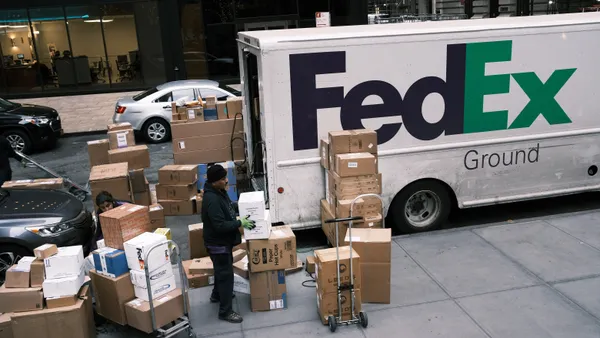Dive Brief:
- An increase in e-commerce orders over the past five weeks has pushed DHL's parcel volume to peak season levels, according to a press release issued Wednesday. Domestic volume has increased by 36% and cross-border numbers increased by 28% compared to daily averages seen in February.
- The fastest-growing product categories include nutraceuticals (dietary supplements), health and beauty items, apparel, pharmaceuticals and home office supplies, according to the carrier. These categories are seeing 40% to 50% volume increases, Craig Morris, vice president of strategy and product management at DHL eCommerce Solutions Americas, told Supply Chain Dive via email.
- The volume increase is primarily showing up in the Northeastern U.S. with "a significant amount of volume" coming in from China as factory operations there begin to normalize, DHL eCommerce Solutions Americas CEO Lee Spratt said in a statement.
Dive Insight:
Increasing e-commerce volumes have been a challenge for shippers as consumer panic-buying and state stay-at-home orders radically shift demand.
E-commerce sales overall grew 49% year to date, with electronics sales increasing 58% and online grocery sales going up 110%, according to Adobe's Digital Economy Index released Tuesday. Buy online, pickup in-store (BOPIS) sales more than doubled year-over-year in April alone, the report found.
"The new normal for e-commerce will certainly be substantially higher [volume levels] since many online companies have earned the business and faith of many new customers, and brick and mortar companies have increased their focus on online channels which is sure to stick to some degree," Morris said.
For retailers making the shift to more e-commerce, he said they will need to be willing to spend more on their fulfillment operations to retain employees and expect that "average costs per order will go up."
For shippers, this has highlighted the importance of an agile omnichannel strategy to get inventory out of closed storefronts either with curbside pickup or to consumers' homes directly. For the latter to work, retailers are increasingly relying on 3PL partners to carry deliveries, which has caused delays and financial challenges for carriers as they cope with the increased loads.
For shippers relying on 3PLs to get increasing numbers of online orders to their customers, maintaining on-time delivery and meeting consumer expectations remains key, particularly as overall economic demand continues to decline. FedEx and UPS have suspended service guarantees as of March 24 due to disruptions from the COVID-19 outbreak.
By April, UPS said average domestic daily parcel volume was up 8.5% YoY for Q1 and that the shift in volume from commercial to more consumer deliveries was hurting its profitability, causing it to review pricing on a customer by customer basis.
And FedEx is capping the number of parcels 24 major retailers can ship from certain locations via its Ground network due to significant increases in volume, according to The Wall Street Journal. The companies include Abercrombie & Fitch, Bed Bath & Beyond, Groupon, Kohl's and Nordstrom.
Many of these brands are using stores to fulfill online orders and "capping the number of packages to be picked up at these locations will limit any negative impacts to the FedEx Ground network," a FedEx spokesperson told the Journal. The move is similar to what the carrier does during the holiday shopping season to limit negative impacts on its network, the spokesperson said.
When asked if DHL is considering similar moves, Morris told Supply Chain Dive, "At DHL eCommerce Solutions we have not capped any customers’ volume. We are watching our volume growth very closely and if in the future we need to slow down onboarding new customers that is a decision we will make if necessary, but it’s not the case at the moment."














